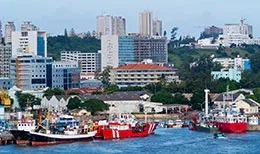
News

Macauhub: Eaglestone says that Commercial banking thrives in Mozambique in times of adversity

Commercial banking thrives in Mozambique in times of adversity
Commercial banking in Mozambique has managed to maintain high growth rates, but recent adversity in the economy may bring changes to the banking landscape, including mergers and acquisitions, according to analysts.
Last year, even before the country's Western partners cut budget aid and the security situation deteriorated, the economy slowed by 1.1 percentage points to a growth rate of 6.3 percent, but the balance sheet of banks continued to grow "at an impressive rate," according to Eaglestone Securities.
In a recent report on Mozambican banking, in which it analysed the accounts of the six largest banks in the country, the consultancy said that assets, loans and deposits all continued to grow by 20 percent compared to 2014.
About 70 percent of deposits and loans are in meticais, 60 percent of deposits are sight deposits, asset quality ratios remained unchanged "at comfortable levels" and the banking sector is "well capitalised" and its six banks have solvency ratios above the regulatory requirements.
Also according to the consultancy, the profits of the six banks increased again due to a "robust" operating performance despite increased competition, rising wage costs and investment in the expansion of the branch network.
By assets, loans and deposits, the largest bank is BCI Fomento, followed by Millennium BIM, which last year posted higher net profit - US$81.4 million, followed by Standard Bank Mozambique, with US$51.4 million.
Moza Banco, Banco Único and Barclays Bank Moçambique completed the top six list among the 19 banks in the country - the latest of which is Portuguese-owned Banco Big.
The banking landscape of the country will suffer significant changes in the short and medium term, through the sale of Moza Banco, part-owned by Portugal's Novo Banco, which should also change hands, but BCI may also change its shareholder composition, due to changes in the capital of BPI in Portugal, one of the Mozambican bank's main shareholders, alongside state bank Caixa Geral de Depósitos (CGD).
"We believe that the deterioration of the conditions in the foreign currency market this year may have an impact on the Mozambican banking landscape in the medium term," says Eaglestone.
Due to a lack of foreign currency, along with an escalation of inflation, the Mozambican central bank has adopted a more restrictive monetary policy over 2016, while the government was required to submit an amending state budget with austerity measures demanded by the IMF and by most Western partners as a condition to restoring budget aid.
Budget aid was suspended because of the disclosure by the government of previously hidden debt in excess of US$2 billion.
Research:http://www.eaglestone.eu/xms/files/arquivo/2023-08/Mozambique_Banks_June2016.pdf